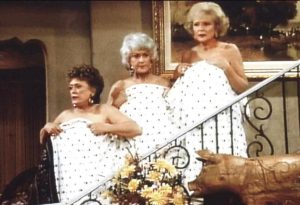Unless you’ve been completely cut off from pop culture, chances are you’ve heard of the legendary TV show The Golden Girls. This beloved sitcom aired from 1985 to 1992 and has since become a cultural phenomenon, winning over audiences from all around the world. What’s truly amazing is that the show, which many expected to be canceled after just one season, ended up becoming a massive hit that remains popular more than three decades after its final episode aired. People still talk about the show today, and it continues to attract new generations of fans who fall in love with its humor, heart, and unforgettable characters.

Recently, Newsner caught up with Stan Zimmerman, who was a staff writer during the show’s very first season. He shared some fascinating behind-the-scenes stories that shed light on the cast, particularly Estelle Getty, who played the witty and sharp-tongued Sophia Petrillo. While viewers remember Estelle for her hilarious one-liners and quick comebacks, Zimmerman recalls a more personal side of her—one marked by kindness, warmth, and genuine compassion.
Stan Zimmerman was a young writer when Estelle Getty visited him and his writing partner, Jim, for the first time. He vividly recalls how excited he was to meet her. “She was so tiny,” he said, “and the first thing she did when she arrived was motion to us, saying, ‘Come here, come here.’” Intrigued, they followed her behind the set, wondering what she wanted to share. Once there, she told them, “Your secret is safe with me.” At first, Zimmerman assumed she was referring to their Jewish heritage, but soon realized she was actually acknowledging their sexual orientation. Having worked with many members of the LGBTQ+ community during her time in the play Torch Song Trilogy, Estelle was both familiar and comfortable with the topic.
Back in 1985, Stan and Jim were advised by their agents to keep their identities hidden while working in Hollywood. It was a different time, and being openly gay could mean fewer opportunities or even backlash. “People today might not fully understand,” Zimmerman explained, “but we couldn’t be open about who we were in the workplace. Estelle, however, made it clear that she supported us. That meant a lot—it was both kind and incredibly meaningful.”
Estelle Getty’s off-screen personality was much softer than her on-screen character. Zimmerman described her as nurturing and motherly. “Even after I left The Golden Girls, we kept in touch. She would call just to ask, ‘Who are you dating? Where are you working?’ and she always had some advice to give.” Their friendship extended far beyond the confines of the set, and he appreciated her thoughtful nature.
Interestingly, although Estelle played the oldest character on the show, she was actually younger than both Bea Arthur and Betty White. To make her appear older, the makeup team had to work diligently, using extensive old-age makeup techniques. Zimmerman chuckled as he recalled a funny story: “Between the first and second seasons, Estelle got a facelift. The makeup team was puzzled. They asked, ‘Estelle, what’s going on? You look too good now!’ She was just thrilled to be in Hollywood. Imagine chasing a dream your entire life, nearly giving up, and then finally making it big—it’s incredible.”
However, behind the scenes, Estelle was struggling in ways few people knew. Zimmerman revealed that she was dealing with early-onset dementia, though it hadn’t been diagnosed at the time. The live tapings were especially challenging. “Friday night recordings were rough for her. She was under a lot of pressure because she was starting to forget her lines, and it really stressed her out.” The other cast members, especially Bea and Betty, were supportive and helped ensure she was ready to perform.
To cope, Estelle went to therapy multiple times a week, something Zimmerman learned only because they were close. Meanwhile, in the writer’s room, there were misconceptions. “People assumed she was out partying every night, that she wasn’t taking time to rehearse, but the truth was, she was fighting a private battle.”
The production team had to take extra steps. “Her managers and the executive producers got involved. They had to make sure she was on top of her lines,” Zimmerman explained. Unfortunately, with dementia, even the most diligent preparation isn’t always enough. “It’s terrifying. You can study all day, but if your brain can’t hold onto the lines, it doesn’t matter.”
To help her, the team employed creative methods. “Sometimes we wrote her lines on her hands, or taped them to props. Eventually, we used cue cards. When you see her eating raisins in scenes, that’s us finding ways to support her.” Despite her difficulties, Estelle always delivered. “Every time she spoke her lines, it was like a home run. We always relied on her to nail those funny zingers at the end of a scene, and she never disappointed.”
Zimmerman also spoke about Betty White, admitting his initial impression wasn’t positive. During tapings, when Estelle forgot lines, Betty would engage the audience with jokes. “I thought it was mean at first,” he confessed. But over time, he reconsidered. “Maybe she was trying to buy Estelle time, to keep the audience engaged while giving her space to recover.”
Rumors of tension between Bea and Betty have circulated for years. Zimmerman heard whispers but didn’t notice anything major during his time there. “They just had different styles. Bea was a theater actress, very serious about staying in character. Betty liked to chat and joke, even between takes. That probably didn’t sit well with Bea.”
One thing that made The Golden Girls special was how the actresses appreciated the writers. “They always thanked us in interviews. That doesn’t happen often in Hollywood. I’m so grateful for that.” Fans often think the show was improvised, but Zimmerman clarified: “They stuck to every word, comma, and period. Everything was from the script.”
He detailed these experiences in his book, The Girls: From Golden to Gilmore, which also covers his time with stars like Roseanne, Lily Tomlin, and Lauren Graham. Today, Zimmerman continues sharing meaningful stories through his play Right Before I Go, inspired by a friend’s suicide.
If you’re a fan of The Golden Girls, share this article with others who’d enjoy these rare behind-the-scenes insights!





